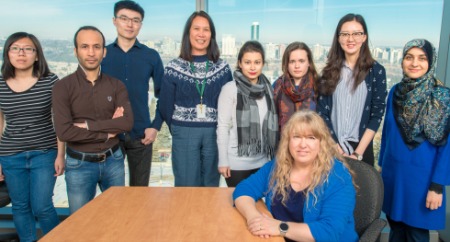
TOP TEACHER: "I understand thermodynamics, and I explain it to them," said Janet Elliott (seated). "That's really it."
(EDMONTON) There are many qualities that shape a good educator, and it's hard to say which ones come to the fore when "good" becomes "excellent." Maybe it's the perennial love of your subject-thermodynamics in Janet Elliott's case-and maybe it's an inherent desire to help, and the countless hours of scrupulous work you put into preparation. These are also qualities of Elliott, and in recognition she has landed the highly coveted APEGA Award for Excellence in Education.
"Teaching's easy for me. I love thermodynamics, and I care about students," said Elliott, a professor in the Department of Chemical and Materials Engineering, and a Canada Research Chair in Thermodynamics.
Elliott's passion for her field-and cultivating that passion in students-powers her classes and makes them engaging. What facilitates the learning process for her is the time and effort she dedicates to designing assignments, mentoring teaching assistants, replying to student emails and finding new ways to break down the elegant math behind thermodynamics.
"Every time I teach, I think of how I can do it better-every lecture, every explanation, every assignment, every exam," Elliott said.
"We do a really good job of teaching CHE 243. We work as a team, so many instructors contribute to the course's success," said Elliott. For the past three years, Elliott has collaborated with another professor, Anastasia Elias, to fine tune CHE 243, Engineering Thermodynamics. It's a project that received recognition through the University of Alberta's Unit Teaching Award.
"We spend a month preparing the final," said Elliott. "There cannot be any mistakes in it, it has to exactly test all of the things we want to test, in a fair way, and it has to have clear wording. To achieve this, we put in lots of effort."
Her zest for teaching and meticulous preparation resonate with students. For the last five years, Elliott's teaching has secured all-star ratings of 4.9 or five out of five. These scores place her among the top-rated instructors in the Faculty of Engineering.
"I understand thermodynamics, and I explain it to them," said Elliott. "That's really it."
When Elliott first joined the University of Alberta in 1996, she focused on research. "I didn't know how much I would love teaching," Elliott said. Unlike research that takes years and many cohorts of graduate students to yield tangible results, good teaching has immediate rewards. "You go into a class for an hour lecture and you realize you taught somebody something. In a short time, you're getting a lot of feedback," said Elliott.
Of what it takes to become an excellent educator, Elliott said: "People are either born teachers, or they're not. If you're doing something you love, it's easy to do a good job." Although teaching might be a gift, it takes experience and hard work to excel. "So you need to realize how much time it's going to take to do a good job. To teach your first course, it might take you all of your full-time effort for the entire term," she said.
"I've always wanted to be a professor. I love thermodynamics, so I do it in my research and in my teaching. I never thought of having any other job."